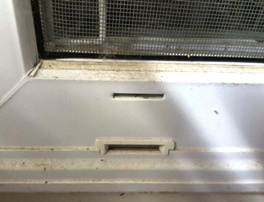Blowing Attic Insulation, Without Vapor Barrier, Below Roof Steel
A very common problem I see involves people not preparing their post frame (pole barn) buildings to adequately be insulated.
Reader NED in THURMOND writes:
“Thank you for your help. I’m in process of completing a pole barn project. It’s divided into three sections…living area, workshop, and garage. The size is 24 x 44. The outside perimeter wall is 2×6 frame with OSB and metal on the bottom and metal only in the top portion. The wall cavity is filled with unfaced insulation and poly on the inside. The roof is 8’ oc trusses with metal panels and no moisture barrier. 6 mil poly was applied to the ceiling joists. I wanted to insulate the ceiling, so I removed the poly and plan to install Sheetrock and blow in R-38 overhead. The building has a ridge vent and soffit vents in the eaves. Do I need a moisture barrier on the ceiling or will the blown in insulation suffice? What, if any problems do you anticipate? Thank you so much.”
Mike the Pole Barn Guru responds:
Here are some anticipated problems –
 Without some method of condensation control beneath your building’s roof steel you are going to have moisture problems. Blown in fiberglass or cellulose insulation will lose their effective R value once they get wet. A practical solution will be to have closed cell foam insulation sprayed upon roof steel underside. Normal recommendation would be two inches thick however your local applicator(s) can give you their best input from experience. Make sure spray foam does not block either eave air intakes or ridge exhaust points. You can create a “dam” at eaves to keep blown in insulation from filling soffits, by use of ripping high R closed cell insulation boards. Again, make sure not to block incoming airflow (you need a minimum of least one inch of free area above insulation boards).
Without some method of condensation control beneath your building’s roof steel you are going to have moisture problems. Blown in fiberglass or cellulose insulation will lose their effective R value once they get wet. A practical solution will be to have closed cell foam insulation sprayed upon roof steel underside. Normal recommendation would be two inches thick however your local applicator(s) can give you their best input from experience. Make sure spray foam does not block either eave air intakes or ridge exhaust points. You can create a “dam” at eaves to keep blown in insulation from filling soffits, by use of ripping high R closed cell insulation boards. Again, make sure not to block incoming airflow (you need a minimum of least one inch of free area above insulation boards).
Planning a new post frame building? If so, I encourage you to take appropriate steps for your building to have future insulation installed. Yes, there will be some initial investment involved.However it will be so much less expensive to plan for it now than to wish you would have later.









